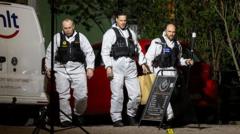As Sweden's celebratory Walpurgis festival approached, a tragic shooting cast a long shadow over the festivities in Uppsala. On the eve of the event, three young men aged between 15 and 20 were fatally shot at a barber shop, sparking fear and concern for safety in a city preparing for its largest celebration of springtime, known for attracting students and revelers alike.
The shooting unfolded in the bustling vicinity of Vaksala Square around 5 PM on Tuesday, leaving witnesses in shock. "I thought it was fireworks at first," recalled a neighbor, Sara. The swift arrival of police and emergency services highlighted the serious nature of the incident, which local media initially reported included masked assailants on electric scooters.
The arrested suspects initially included a 16-year-old, with evidence leading to multiple arrests ranging from youths to adults. The nature of the crime remains under investigation, with suggestions linking the shooting to the ongoing issue of gang violence in Sweden, an increasing concern highlighted by Swedish authorities in recent years.
Despite the traumatic event, festival activities continued largely as planned, albeit with heightened security measures. Many local young people gathered to enjoy the annual student raft race and other festivities, some expressing that they felt a sense of safety due to police presence. "It doesn't feel like I'm in danger," said social studies student Alvin Rose, even while acknowledging the community's unease.
However, others reflected a normalization of violence in Sweden, with many young people associating gun crime and violence with everyday life. Kassandra Fritz, a university student, voiced her desensitization to news of shootings, recognizing the alarming trend not only locally but nationwide.
With more than a decade of increasing gun violence, often attributed to youthful perpetrators linked to gang networks, Sweden's government is contemplating stronger legislation to tackle this spiraling crisis. New proposals may include controversial measures such as wiretapping minors suspected of gang involvement and an overhaul of current gun control measures.
Tributes emerged from the community in the wake of the tragedy, with numerous individuals paying their respects at the site of the shooting. The deep emotional impact was illustrated through gestures of solidarity as students mourned the victims, reflecting on the harsh reality of youth involvement in crime.
In a sobering acknowledgment, Sweden's Prime Minister Ulf Kristersson condemned the violence and underscored the need for decisive action to combat what he termed an ongoing wave of violence. The Uppsala shooting serves as a poignant reminder of the challenges that lie ahead, as communities grapple with the realities of safety amidst festivities.




















